Baku. 14 September. REPORT.AZ/ Report News Agency presents an interview with the representative of United Nations High Commissioner For Refugees (UNHCR) Furio de Angelis.
- Could you please first give us brief information about yourself? What is your background?
- I'm from Italy and I've been with UNHCR for now 27 years and I went around so many different operations. I mainly worked in Central Asia in Eastern Europe. I've been in former Yugoslavia, in Croatia during war, in Ukraine, Turkey, Pakistan, Afghanistan, Central and East Africa, Ukraine. And before coming to Azerbaijan I was representative in Canada and now I am representative in Azerbaijan.
- What are your goals as a representative of UNHCR in Azerbaijan?
- As a representative of UNHCR in Azerbaijan I represent the High Commissioner for Refugees Filipo Grandi and its Mandate given to him by the United Nations General Assembly. UNHCR office has a global mandate to work together with the governments, to advance the protection of refugees and of Internally Displaced Persons, or to eliminate statelessness in the world and ensuring that refugees and asylum seekers enjoy their rights that they are given under international law.
- How do you assess the level of cooperation between UNHCR and Azerbaijan?
- It is excellent from the beginning. UNHCR had a large assistance programm in the early 90’s to deal with the consequences of the conflict that created the displacement of so many people inside Azerbaijan. The level of assistance has decreased throughout the years. We are no longer able to provide high level resources and our programs remain focused on working together with the government and monitoring the implementation of the assistance operations. Moreover, UNHCR role is also to raise international attention to the plights of displaced persons in Azerbaijan and contribute, in the limit of our humanitarian mandate, to the just solution of the problems of displaced persons.
- You said that the number of projects in Azerbaijan has decreased. Is it because Azerbaijan has developed much or there is another reason?
- There are two main reasons. First of all, throughout the years Azerbaijan invested a lot in terms of resources, in terms of political will, national attention to the rights and protection of displaced persons. This is an excellent demonstration of capacity to take care of the internally displaced persons, this is what we want from all countries in the same situation. We ask countries to care for displaced persons and provide resources. Azerbaijan has done it and that's why we say that the level of programs that Azerbaijan has put in place for displaced persons is a good example to other countries.
- How do you assess the work of the Azerbaijani government regarding refugees in our country? How do you assess their living conditions?
- If we are talking about refugees, this means people that are coming to Azerbaijan to seek protection and asylum, we have to say that the government Azerbaijan has put in place the most important basic foundations to implement and exercise the duties of providing protection to refugees. For instance, Azerbaijan signed the international convention regarding refugees - the 1951 Convention relating to the status of Refugees. The government has put in place a system for determining the status of refugees. The State Migration Service is the institution that processes cases. This institutional set up is very important and an excellent basis for advancing refugee protection. Of course, more work has to be done. We are advocating for improvement in legislation with amendments with respect to refugee legislation. We hope to see it approved as soon as possible and we are working together with State Migration Service to make sure that the implementation of the law is fair and according to international standards.
- What kind of amendments are you expecting to be accepted in Azerbaijan?
- The amendments to the legislation which are currently under attetion of the parliament are intended to improve the protection environment in Azerbaijan by introducing the notion of complimentary protection, which allows to expand the protection not only to refugees who are individually persecuted but also, for instance, to the victims of conflicts and of generalised violence. This would be an important improvement in the national legislation on refugee protection.
- How many asylum seekers are there in Azerbaijan right now?
- The number of refugees in Azerbaijan is limited compared to other regions. At the moment, there are some 1,400 refugees in Azerbaijan, and this year less than 100 persons have so far come to Azerbaijan seeking asylum.
- Speaking generally, is there increase in number of refugees in the world? How many people on the Earth are living as refugee?
- The situation with displaced persons in the world is dramatic. As it is often reported by UNHCR, there are more than 65 mln. people living as displaced persons because of war and prosecution. Of them more than 20 mln. are refugees, including 5 mln. of Palestinians. And there 33 thousand people who leave their home on daily basis because of wars, conflicts, violation and abuses of human rights. Syria today remains the major "producer" of refugees but there are so many crises around the world, like Central Africa, South Sudan.
- Does UNHCR intends to implement any projects in Azerbaijan?
- We have a presence here and this is a very important project as with our presence we provide support to the government to exercise its duty of granting protection to refugees, improving the living conditions of Internally Displaced Persons. We assist the government in maintaining international attention to the plight of displaced persons in Azerbaijan hoping for a quick and just solution to their problem. . We also have limited projects of direct assistance for the most vulnerable among the refugees, while we advocate for the access of all refugees to the work market and to basic services. In this regard, we are very thankful to the Ministry of Health who recently gave access for refugees to get primary healthcare in public health facilities. This is very important step and we look forward to continue this process.
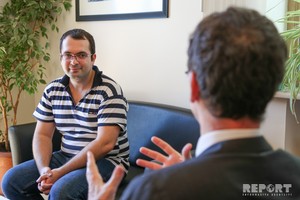
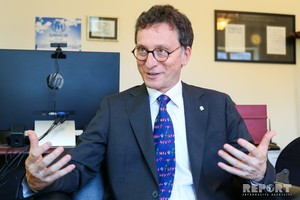
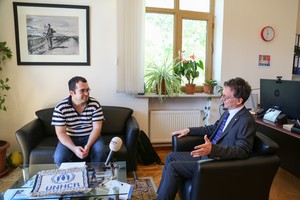
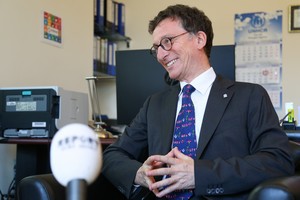
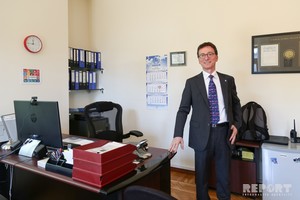


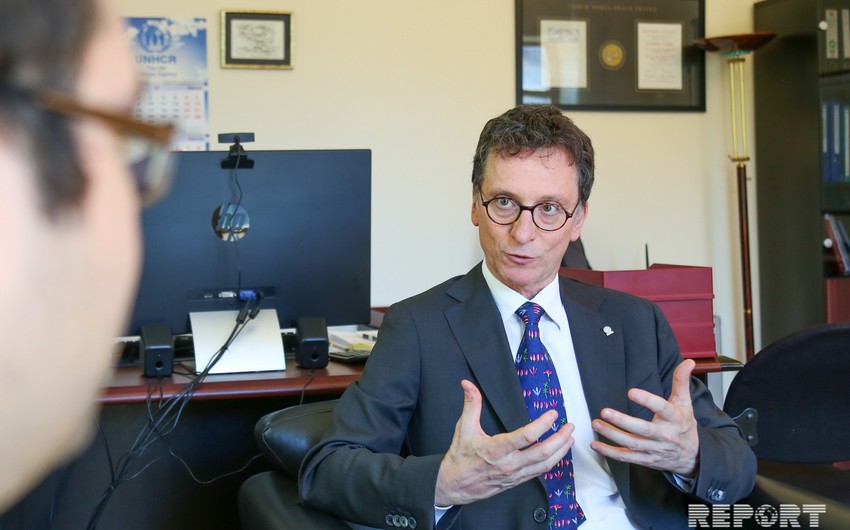 https://static.report.az/photo/ce049f40-e451-4973-98c0-771d9a47b5a8.jpg
https://static.report.az/photo/ce049f40-e451-4973-98c0-771d9a47b5a8.jpg

